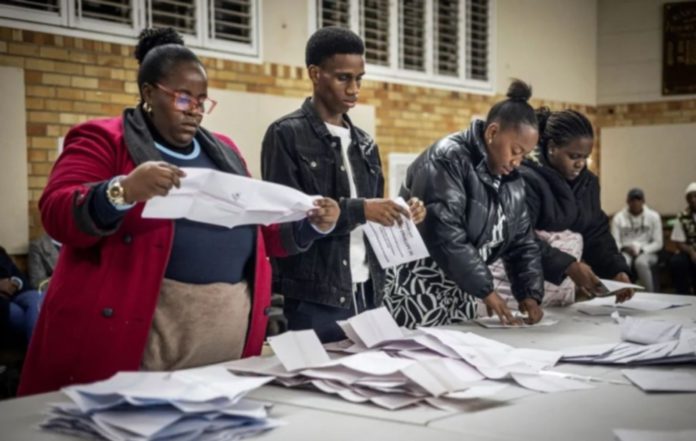Change has been a recurring sentiment, especially among young voters.
Ayanda Hlekwane, one of South Africa’s “born-free” generation, meaning he was born after 1994, said despite having three degrees he still doesn’t have a job.
“I’m working on my PhD proposal so that I go back to study in case I don’t get a job,” he tells the BBC in Durban.
But Mr Hlekwane said he was optimistic that things would change.
A record 70 parties and 11 independents were running, with South Africans voting for a new parliament and nine provincial legislatures.
Analysts say this shows that many people are disillusioned with the ANC.
“We are entering the next phase of our democracy, and it is going to be a big transition,” political analyst Richard Calland told the BBC.
“We will either become a more competitive and mature democracy, or our politics will become more fractured.”
The main opposition party, the Democratic Alliance (DA), has signed a pact with 10 other parties, agreeing to form a coalition government if they get enough votes to dislodge the ANC from power.
But this is highly unlikely, with the ANC expected to remain the biggest party, putting it in pole position to lead a coalition if its support does drop below 50%.
It got 57.5% of the vote in the last election compared to the DA’s 21%.
South Africans do not directly vote for a president. Instead, they vote for members of Parliament who will then go on to elect the President.
So current President Cyril Ramaphosa is likely to remain in power.
Former President Jacob Zuma caused a major shock when he announced in December that he was abandoning the ANC to campaign for the new uMkhonto weSizwe (MK), which translates as Spear of the Nation.
Although he has been barred from running for parliament because of a conviction for contempt of court, his name still appeared on the ballot paper as MK leader.
The MK is expected to do especially well in Mr Zuma’s home province of KwaZulu-Natal, where tensions have been high, with some incidents of violence reported during the campaign.
Police and the army have been deployed to polling stations across the country to ensure that voting takes place peacefully, and that ballot papers are not stolen.
More than 27 million people were registered to cast their ballots, including a high percentage of young voters, who could prove decisive.
Artist Njabulo Hlophe, 28, said young people in South Africa tend to get marginalised but, “this is as much our country as our parents… they’re leaving it to us, so someone that really cares about the young people is someone I’m really looking at”.
Support for the ANC is expected to be higher among the older generation.
One 89-year-old woman, Elayne Dykman, told the BBC in Durban she hoped that young people in South Africa did not take their vote for granted.
READ ALSO:


